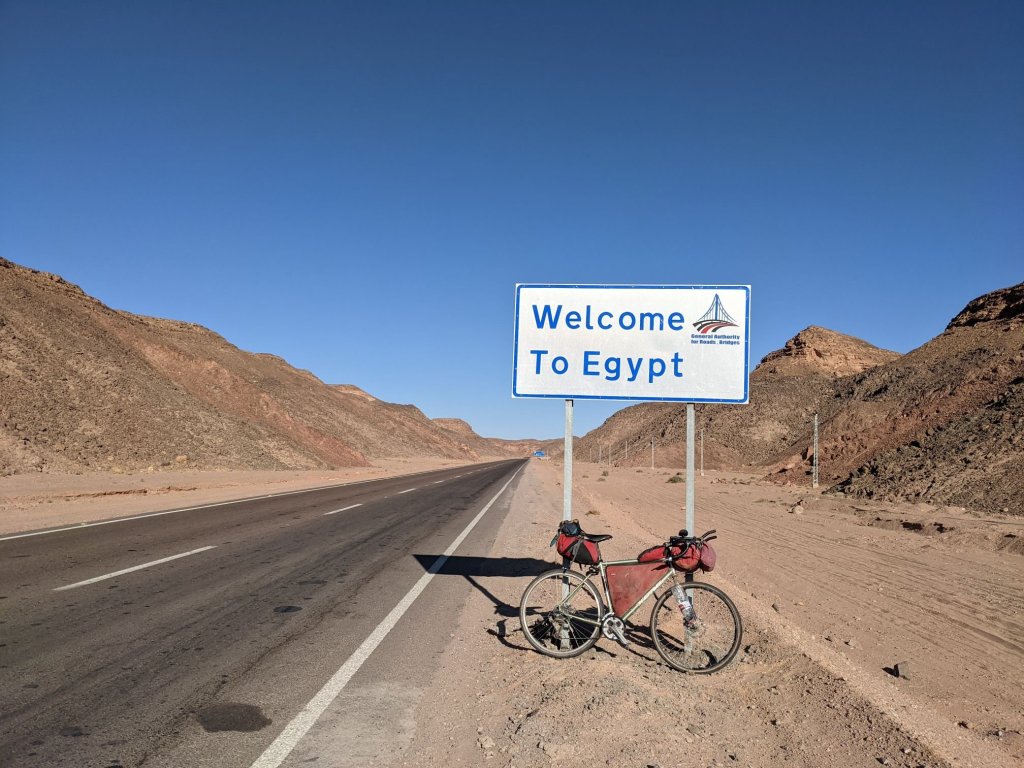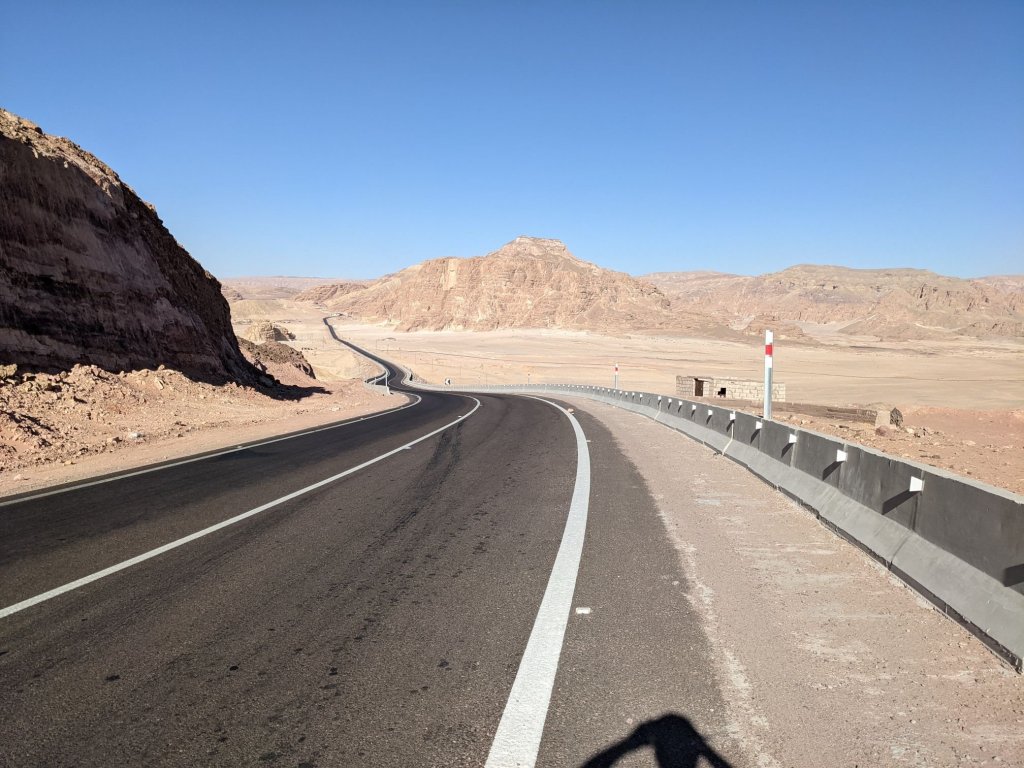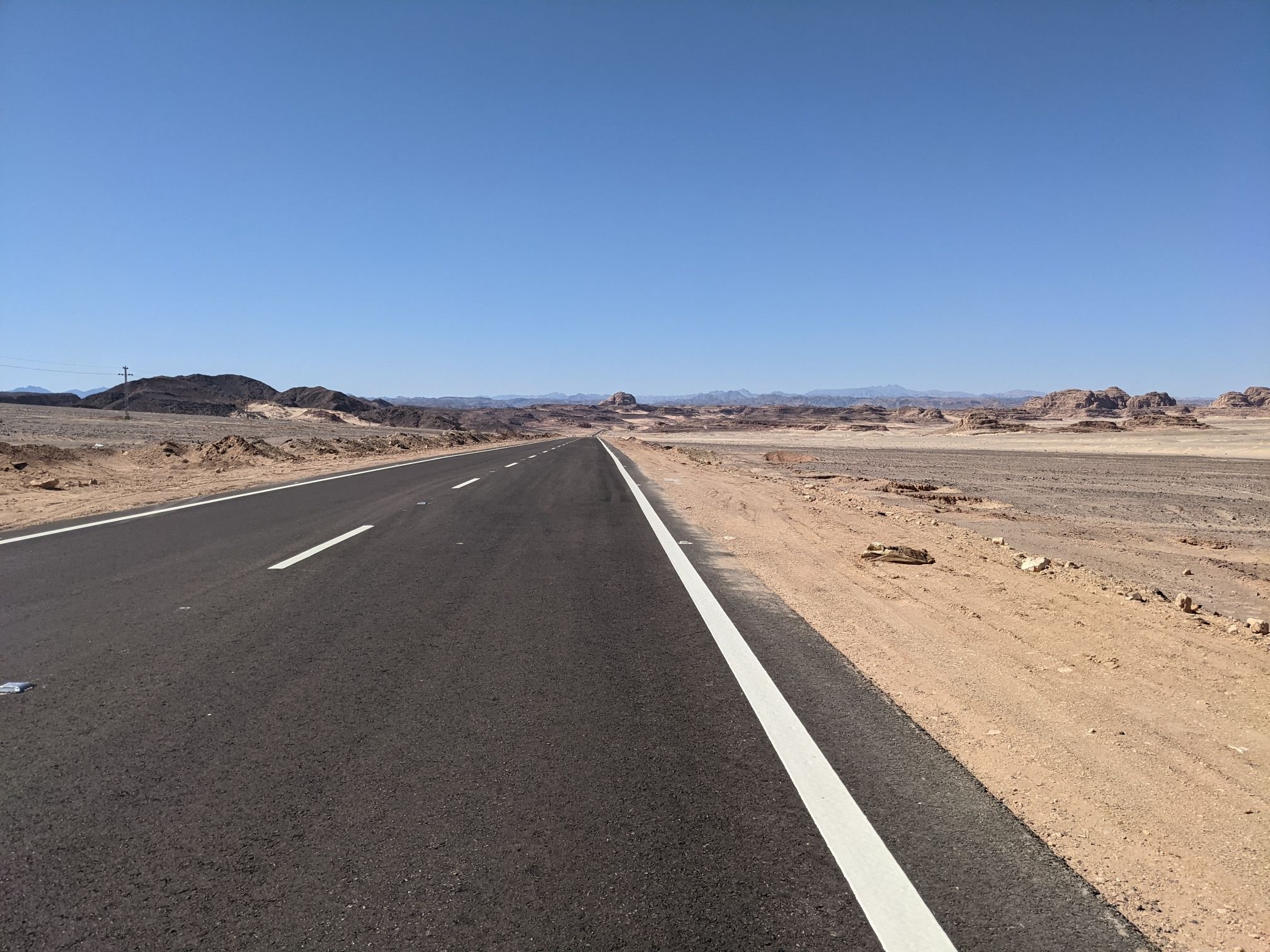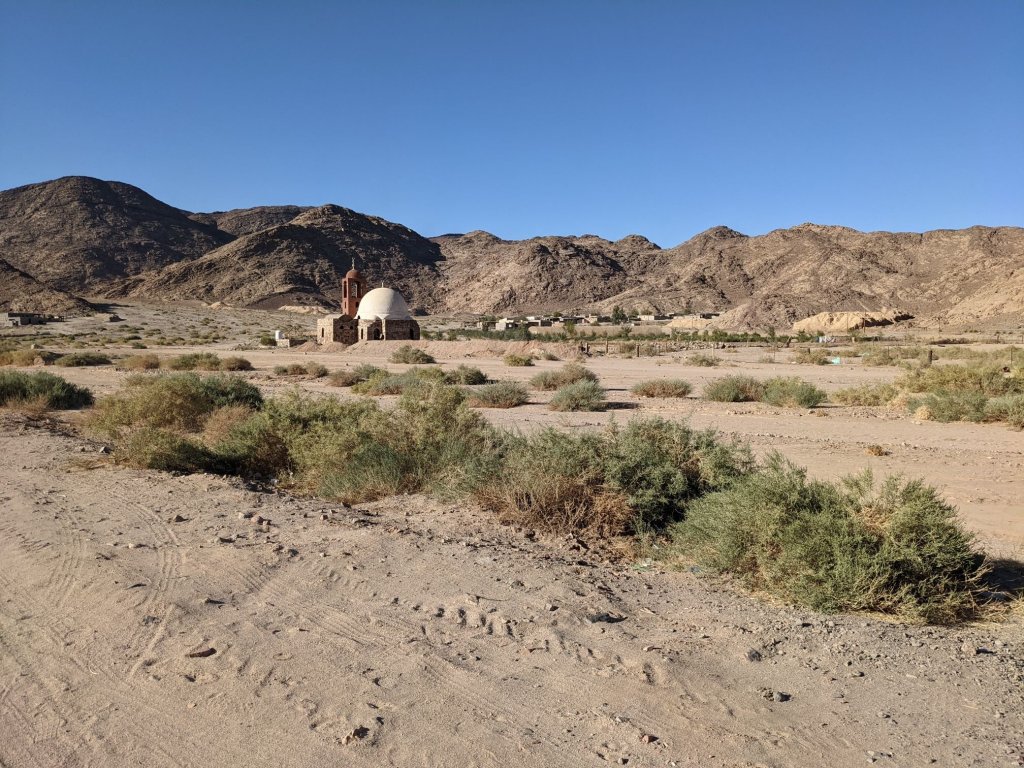I managed to get a couple hours sleep before being woken at 4.30 as the ferry arrived in Egypt. The other foreigners (a group of Saudis) and I were gathered up and taken off the boat first to go through immigration proceedings.
Egyptian police are notoriously unhappy about people travelling by bike. A couple of weeks ago someone took a ferry from Aqaba to Taba, a nearby Egyptian port, and spent 5 hours there. They threatened to send him back to Jordan but eventually let him go when the owner of a hotel he’d booked a room at showed up to drive him, with two police cars following.
I wanted to avoid that so I told them I was going to be taking a bus from Nuweiba to Cairo, but staying in Nuweiba for a couple nights first so they didn’t try to take me to the bus station. They seemed OK with this and, after I bought my visa and went through a cursory customs check, they gave me directions to a hotel then let me cycle off.
I found an ATM and a supermarket, which was open despite the fact it was an hour before dawn. There were loads of people about, seemingly taking the ferry back to Jordan. I found a quiet place, changed into my cycling clothes and repacked the bike as I waited for it to get light.
Once it was light enough I set off cycling, beginning with a climb up to around 800metres.

At a junction, where I left the coastal road, there was a police checkpoint. There were some dogs barking as I passed so I could plausibly claim I didn’t hear the guy calling out as I rode through.

From here, the road followed a series of rolling hills through the Sinai desert, with another great view after I crested each hill.



This is not in fact my first time riding through the Sinai, though the last time was 20 years ago and I was on a camel.

The second checkpoint I passed through was by a small military installation. There was only one soldier there and he was checking another car at the time. He waved and called for me to wait but I played dumb, waving back and saying hello as I rode through.
I hadn’t expected it to be so easy and had anticipated refilling water while dealing with police. As a result, I was getting a little low on water and had to use it sparingly.

The road began a consistent climb, slowly bringing me up to a high point of 1450 metres. As I climbed, I felt my rear tyre going flat. At the same time, two police vans passed and gestured for me to stop.
They suggested I put my bike in a van, but were willing to take no for an answer. One, Mocktor, spoke a little English, and he refilled my water while I patched the tube.
I set off in front of them, unsure if they intended to follow me. I soon felt the rear tyre going flat and ducked behind a low wall for shade. The patch had failed, and I decided to just replace the tube. Through a gap in the wall I saw the police drive past.
Shortly after the pass, there was a junction with a police checkpoint. I took a shortcut through a petrol station forecourt to avoid it, and began the long, very gradual descent.
The fourth checkpoint of the day was a bit more serious. It was a military compound, with a tower on one corner where a man sat with a machine gun. Several soldiers with AK47s were checking IDs as people passed, though the guy with a spare magazine stuck on with parcel tape did let the aesthetic down a bit.
They took my passport and I had to wait half an hour as they waited for approval from the “big man,” as was translate to me via a local passing through the checkpoint. I lay down on a shaded patch of gravel and closed my eyes. After about half an hour my passport was returned and I was allowed to continue.
As I lost altitude, I started to see more green, with trees lining the road. I reached a village, and stopped to get water. This village seemed to go on forever – even where there were no buildings, there’d be a man walking or a group of children playing. At last though I reached an area without people, and wandered over to a ruined building to set up camp.


Over 8 hours moving time on 2 hours sleep left me quite tired, and I fell asleep without even setting up my air mattress. I was glad I’d gotten a head start on sleeping when a strong wind arose in the morning and stopped me getting any more sleep.
I continued descending. For now the strong wind that woke me up was a tailwind so I was flying along and could soon see the gulf of Suez.

As I turned north to follow the coast, there were two road options – a major highway and a smaller option. I chose the smaller option, but this meant going through a checkpoint.
They were very insistent that I stop, and I did. They took my passport (“one minute,” they said). There were various questions at different point, often repeated – things like my name and phone number. I think most of them probably couldn’t read my passport since it’s written in Latin script.
“5 minutes,” I was told. Repeatedly. Various phone calls were made. I was offered food and drink (I just filled up my water bottles). I was asked if I wanted to wash my face – rude, but not unreasonable! Eventually they said they were waiting for a police escort to follow me. One of them spoke a little English, and he said it was because of the rules and for my safety. I asked him if he’d ever seen an incident here and he admitted he hadn’t, but it was the rules.
A few more “5 minutes” later, 90 minutes after I’d arrived, I rode off with two police vans following me. They’d been with me barely 5 minutes when they overtook and drove off into the distance. I don’t know if there was a misunderstanding or they just got bored. So much for my “safety!”
I rode on. The wind was now a headwind, and very strong, so I crawled along at about 13 kilometres an hour.
Some more police vans stopped me after about half an bour and, after a quick check of my passport, let me continue, with them as escort. A few minutes later, they stopped and said I had to turn around.
They now said I had to turn around and go back the way I came. We argued for a little while, with a few other police vehicles coming and going. They were pretty implacable and I agreed to turn around. When I asked for my passport back, they said one of the other officers had driven off with it and I’d get it back later. I told them I wasn’t going anywhere without my passport and sat down on the ground to wait.
After about 45 minutes another police vehicle arrived with my passport. They said I had to put my bike in the van, and since it was going backwards I didn’t argue too much. I sat in the front with the ranked officers while my bike had to go in the back with the regulars. At least they didn’t put it in the cell like a common criminal. The trip back to the checkpoint was a lot faster – maybe because there was a tailwind now.
Back at the checkpoint, they were now pretty determined I wasn’t going to cycle. The Director of Security for South Sinai had got involved. I spoke to him on the phone and he said I should be glad I’d cycled as far as I had: if he’d known about it earlier he would have put a stop to it. I suppose the fact that I cycled 200 kilometres against his wishes says something about a lack of direction over security but I decided not to point that out.
They use various excuses. At one point I was told the mountains were too difficult, for instance. The highest point on the road ahead is 160 metres. My reading of it is that the Director would get in trouble if anything happened to a foreigner cycling through and so, even if there’s no greater risk than anywhere else, it makes his life easier if he just doesn’t allow it.
Some of the people there seemed sympathetic or even apologetic, but it was over their heads. I chatted a bit to a friendly Major on posting from Cairo.
Eventually a bus was stopped and they requisitioned a place for me. I and my bike were put on this bus and sent away.

A few hours later we reached the Suez Canal. There was a big security installation beforehand where all the men got off the bus, presumably for some sort of ID check. I stayed on the bus with the women and kids. A security guy came on and didn’t seem to care I was there.
Having crossed through the tunnel, the bus stopped again. I was let off and, after a few minutes allowed to cycle off. It wasn’t until I stopped to adjust something that I realized I had a police escort. They were quite unobtrusive, driving a few hundred metres behind me.
The road I was on was the main Suez-Cairo highway. I’d considered turning off to a smaller road but the police told me to stay on this one. It had a service road next to the main highway section so I felt safe enough.

Unfortunately a couple police escort changes later, the police decided it wasn’t safe to ride. The other escorts had told me to get in their vehicles but accepted within a few minutes after I said no; this one was different.
After arguing with the police for about half an hour it was pretty clear they weren’t going to budge. They flagged down a minibus and told me to get in. In the end I gave up and did so.
I probably should have insisted on turning onto the smaller road before. but it’s pretty empty out here and it would have got dark long before I reached a hotel so if I still had a police escort that would have been an issue anyway.
I’m conflicted when it comes to these situations. The vast majority of people probably just think it’s mad that I wouldn’t accept a free lift, and most of the rest would think me crazy for arguing for ages with ten agitated, armed police.
I do like to cycle as much of my route as I can, though. Doing otherwise diminishes my sense of achievement in a way – I’d rather feel that I cycled from, say, Cairo to Cape town without adding “except for the bits I didn’t.” I don’t mind these bits as much partly because they’re separate from that main “Cairo to Cape town” route.
But I’ll probably be skipping a bit of that as well – there’s a civil war in the Tigray region, in the north of Ethiopia. There is a possible alternative, going through South Sudan, but I’m only aware of one cyclist who’s been through there. Risk assessment is difficult when there’s so little data to analyse!
Anyway, the minibus driver eventually dropped me off on the middle of a motorway bridge, just as it was getting dark. The motorway was busy and I didn’t want to be cycling there, so I took the only nearby alternative, which went toward the airport.
It was quite difficult to get off this road: a high fence separated it from other roads. I had to ride pretty much all the way to the airport and then take a different exit. There weren’t many hotels around so I rode a while further to get to one. They quoted the somewhat ridiculous price of 200 USD but did let me use their internet.
The cheapest hotel within a few kilometres was still expensive by Egyptian standards at 440 Egyptian Pounds (£22) but I didn’t want to cycle all the way into the centre for cheap hotels. After 2 hours of cycling through a busy city in the dark I checked into this hotel.
The reviews had been pretty terrible, and they were accurate. This hotel thus managed to simultaneously be one of the most expensive I’ve stayed in while touring, and one of the worst. I’ve never seen cockroaches of this size! But it would do for a night’s sleep.

Sept 30: 153 km
Oct 1: 98 km
Hi Nephew, I can understand why Egypt’s security services are so worried about your safety. About 5 years ago they tortured and killed a Cambridge student in Cairo; the message that you can kill local troublemakers but not foreign nationals hadn’t got through to some of their less disciplined personnel. The ructions of that case are still rumbling on — several Egyption police personnel are currently on trial in Italy for the murder. They are presumably concerned that if any harm comes to you they will be blamed, whether it was from the security services, criminals or terrorists. So it’s in their self-interest to protect you, albeit from their own out-of-control personnel.
LikeLike
That could be related! Difficult to know.
LikeLike
oh, and should have said, really interesting blog, do keep writing! Best Wishes from Uncle Fantastic xx
LikeLike